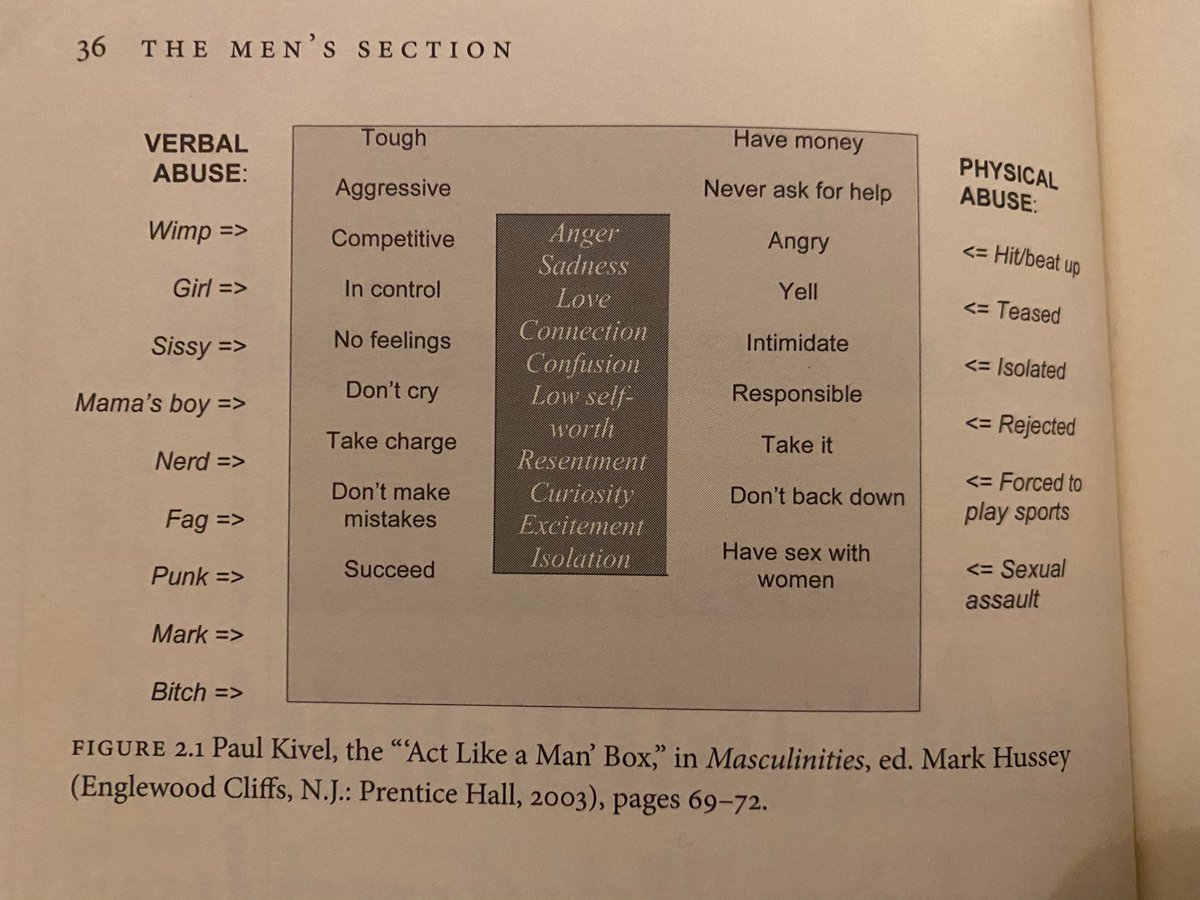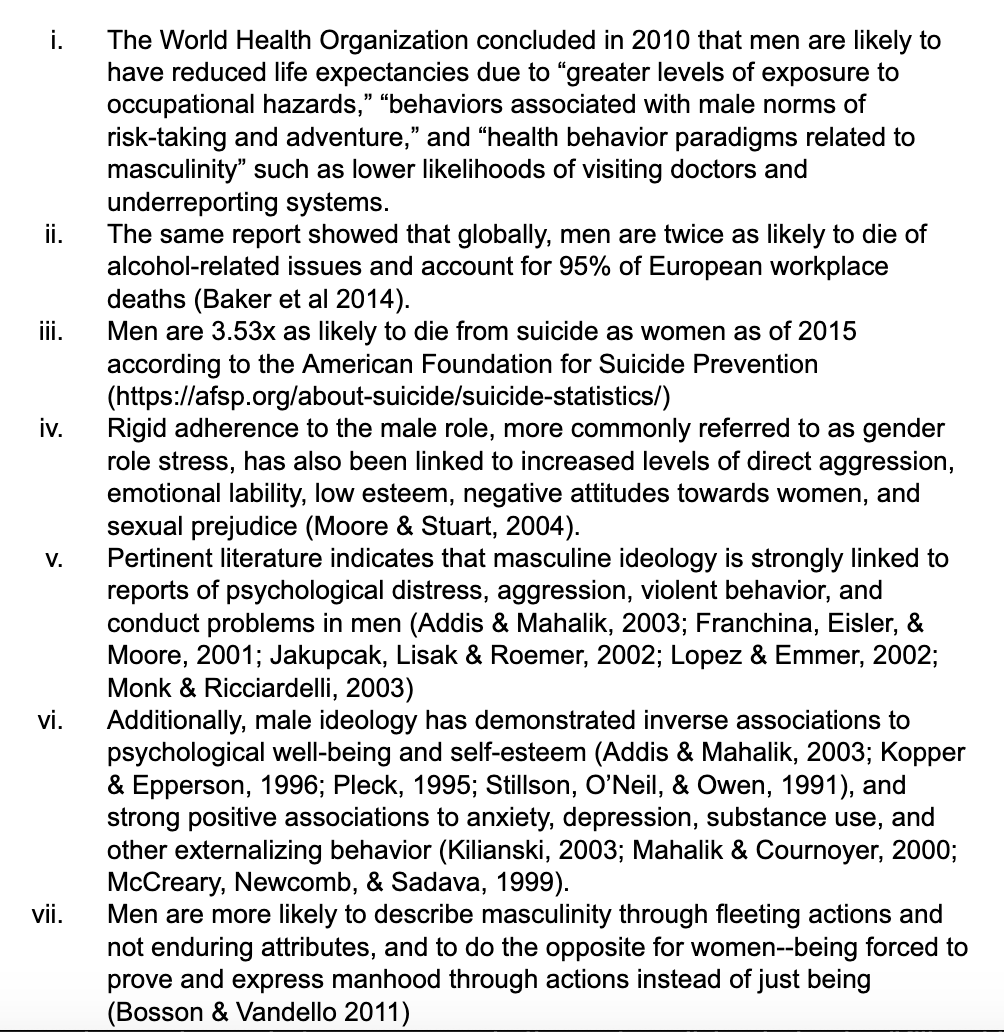Time for the thread on masculinity & Orthodoxy 
 https://twitter.com/DBashIdeas/status/1353400343363633152
https://twitter.com/DBashIdeas/status/1353400343363633152

 https://twitter.com/DBashIdeas/status/1353400343363633152
https://twitter.com/DBashIdeas/status/1353400343363633152
The first thing that so clearly jumps out is the exclusivity of it all. Kiddush clubs, premium items like craft beers, the competitiveness of the mocher of the month, the seclusion of the man caves. It's even marketed for use after "a long week of time with the family!”
Compartmentalization is not only part of the expression of masculinity, it is baked into living it. Men will use these types of things to create a sort of "in-crowd" language for each other, intellectual topics and mutual interests bereft of emotion to bond over.
Research models have documented this! Check out the Act Like A Man Box made by researcher Dr. Paul Kivel. The outer layer is what forces men into certain ways of being, the middle layer is what they have to be, and the middle is what they have to repress to achieve it (language)
Here's where you say "ok Jeremy, but WE aren't like THEM." Maybe (though I'd ask you what part of Jewish culture & Jewish values this magazine is invoking). Here's the research-based model made by Dr. Elana Maryles Sztokman for how Orthodox Jews are supposed to "act like men.”
It doesn't look so different, does it? I'm not saying that a man being cerebral or a great chazzan is bad, but I am suggesting it is bad to set that up as an ideal one can only reach by repressing other parts of themselves or to feel like uncomfortable if they cannot do these.
And Orthodox men know what I'm talking about. The inherent negativity of being "sensitive," how people apologize for sharing things about their personal lives, the feelings associated with not being this "model yid." And conversely, the praise and affection for fitting the box
In the Jewish men's spaces I've run, we've spent whole sessions just discussing anger, sadness, shame. What I hear every time is that they've never had a place to discuss these feelings before. Male relations are built דייקא on repressing these emotions, not sharing them.
It's not only about the emotions repressed to fit the boxes--it's also about the emotions generated by the box. I once had ten men on a program confide in me that they wanted to join our Tanakh learning track, but Tanakh is implicitly coded for women and they had to do Gemara.
The scariest part is that it really harms men ultimately. Here's are some of the research-backed impacts that rigid adherence to masculinity can have on men. The last one brings me back to the magazine: what do meat, cigars, and cars have to do with feeling like a man?
I'm not saying that we have to stop being or feeling like men. But I've really yet to meet a Jewish man who can describe what Jewish masculinity actually is and means. And we deserve the space to learn that, feel it, articulate and identify it. But masculine culture prevents that
It's not because of any one thing: it's a series of cultural, familiar, and educational factors which push this. Check out this wordcloud of the most commonly used words in "boys" vs "girls" toys from 2010. Is it far-fetched to assume that wouldn't have an impact on us?
To cap this off, I was once at a tisch on a work retreat. Thirty rabbis sitting together alone. Many divrei Torah. One person asked: "can anyone stop hiding behind Torah and actually speak about themselves? Their struggles?" Silence. Another hasidishe story.
Finally I spoke about my experience having a chronic illness and the challenges doing my job with it. I got personal. After I finished, silence. And then? Another mayseh. No one else spoke about themselves, no one tried to open up. None of them even spoke about it with me after
I'm yearning for a world where we can connect our souls to each other and not have to hide behind Torah, behind scotch, behind crude jokes. What's the point of Torah that's meant to touch my heart if my friends and peers can't get close to it? What good is a heart alone?
Let's elevate our friendships. Hashem is not afraid to tell us what Hashem is feeling: should we be? Hashem is not afraid to be sensitive and compassionate: should we be? Vulnerability paves the way for vulnerability. כמים הפנים לפנים כן לב האדם לאדם. Let's open up.
/fin
/fin

 Read on Twitter
Read on Twitter





